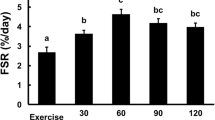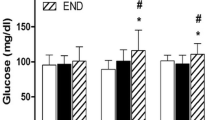Abstract
Background
The consumption of isolated soy protein (ISP) is well known for its beneficial effect on muscle recovery. However, the effect of its combination with maltodextrin, honey, or dates has never been investigated. This study sought to determine the best combination of ISP and different types of carbohydrates for muscle fatigue recovery in the exercise-induced fatigue rat model.
Methods
After 3 days of adaptation, 24 9-week-old Sprague Dawley rats were randomly assigned to four groups: the maltodextrin supplementation (control) group, the maltodextrin and ISP (P1) group, the honey and ISP (P2) group, and the dates and ISP (P3) group. Each group included six rats for the 1-week experiment. Before the experimental period, baseline values of body weight and lactate dehydrogenase (LDH) were recorded for each group. Throughout the study, all rats performed the swimming test until exhaustion every 2 days. Following supplementation, LDH levels were measured three times: immediately after exercise, 3 h later, and 7 days later.
Results
The results showed that the mean LDH of the P2 group was significantly decreased after 3 h (63%) and 7 days (66%) of supplementation (p = 0.05) compared with the other groups.
Conclusion
Ingestion of ISP combined with honey after exercise improves muscle recovery in rats.
Similar content being viewed by others
Data availability statement
The data that support the findings of this study are available from the corresponding author, SO, upon reasonable request.
References
Dupuy O, Douzi W, Theurot D, Bosquet L, Dugué B (2018) An evidence-based approach for choosing post-exercise recovery techniques to reduce markers of muscle damage, soreness, fatigue, and inflammation: a systematic review with meta-analysis. Front Physiol 9:1–15
Alghannam AF, Gonzalez JT, Betts JA (2018) Restoration of muscle glycogen and functional capacity: role of post-exercise carbohydrate and protein co-ingestion. Nutrients 10:253
Rusdiawan A, Mar’atusSholikhah A, Prihatiningsih S (2020) The changes in pH levels, blood lactic acid and fatigue index to anaerobic exercise on athlete after NaHCO3 administration. Malays J Med Health Sci 16:2636–9346
Huang Q, Ma S, Tominaga T, Suzuki K, Liu C (2018) An 8-week, low carbohydrate, high fat, ketogenic diet enhanced exhaustive exercise capacity in mice part 2: effect on fatigue recovery, post-exercise biomarkers and anti-oxidation capacity. Nutrients 10:1–16
Wiewelhove T et al (2019) Effects of different recovery strategies following a half-marathon on fatigue markers in recreational runners. PLoS ONE 13:207313
McCartney D, Desbrow B, Irwin C (2018) Post-exercise ingestion of carbohydrate, protein and water: a systematic review and meta-analysis for effects on subsequent athletic performance. Sport Med 48:379–408
Dahl MA et al (2020) Coingestion of protein and carbohydrate in the early recovery phase, compared with carbohydrate only, improves endurance performance despite similar glycogen degradation and AMPK phosphorylation. J Appl Physiol 129:297–310
Lee MC, Hsu YJ, Yang LH, Huang CC, Ho CS (2021) Ergogenic effects of green tea combined with isolated soy protein on increasing muscle mass and exercise performance in resistance-trained mice. Nutrients 13:4547
Shenoy S, Dhawan M, Sandhu JS (2016) Four weeks of supplementation with isolated soy protein attenuates exercise-induced muscle damage and enhances muscle recovery in well trained athletes: a randomized trial. Asian J Sports Med 7:1–6
Ren G, Yi S, Zhang H, Wang J (2017) Ingestion of soy-whey blended protein augments sports performance and ameliorates exercise-induced fatigue in a rat exercise model. Food Funct 8:670–679
Kirk B et al (2020) Effects of exercise and whey protein on muscle mass, fat mass, myoelectrical muscle fatigue and health-related quality of life in older adults: a secondary analysis of the Liverpool Hope University—Sarcopenia Ageing Trial (LHU-SAT). Eur J Appl Physiol 120:493–503
Kadum H et al (2021) Using dates (Phoenix dactylifera L.) to improve energy metabolism in fatigue-induced Sprague Dawley rats. Futur Foods 4:100077
Qiao D, Hou L, Liu X (2006) Influence of intermittent anaerobic exercise on mouse physical endurance and antioxidant components. Br J Sports Med 40:214–218
Goldfarb AH, Bloomer RJ, McKenzie MJ (2004) Effect of Microhydrin (R) on blood lactate, protein carbonyls, and glutathione status in rats before and after aerobic exercise. Int J Sport Nutr Exe 14:550–559
Medbø JI, Jebens E, Noddeland H, Hanem S, Toska K (2006) Lactate elimination and glycogen resynthesis after intense bicycling. Scand J Clin Lab Invest 66(3):211–226
Tsintzas K et al (2003) Effect of carbohydrate feeding during recovery from prolonged running on muscle glycogen metabolism during subsequent exercise. Int J Sportd Med 24:452–458
Kellman M et al (2018) Recovery and performance in sport: consensus statement. Int J Sports Physiol Perform 13(2):240–245
Mielgo-Ayuso J, Fernandez-Lazaro D (2021) Nutrition and muscle recovery. Nutrients 13:294
Burke LM et al (2004) Carbohydrates and fats for training and recovery. J Sports Sci 22:15–30
Kaviani M et al (2019) The glycemic index of sport nutrition bars affects performance and metabolism during cycling and next-day recovery. J Hum Kinet 27(66):69
Hills SP et al (2019) Honey supplementation and exercise: a systematic review. Nutrients 11(7):1586
Aly MO, Elgohary R, Tayel DI (2019) The effect of honey supplementation formula on delaying some fatigue markers on 1500 meters runners with no impact on performance. Int J Sports Sci 9(3):47–53
Author information
Authors and Affiliations
Contributions
MM and DM conceived of the presented idea. TA, VJ, and DV developed the theory and performed the computations. MM and SO verified the analytical method. LR and SCD carried out the experiment. SO wrote the manuscript with support from MM All authors discussed the result and contributed to the final manuscript.
Corresponding author
Ethics declarations
Conflict of interest
We declare that the authors have no competing interests as defined by Springer, or other interests that might be perceived to influence the results and/or discussion reported in this paper.
Ethical approval
This study was approved by the Ministry of Health of Republic Indonesia (Ethical Clearance (EC) No. 239/KEPK/EC/2022).
Statement of human and animal rights
All of the experimental procedure involving animals were conducted in accordance with the experimental animal care guidelines of the Ministry of Health of Republic Indonesia.
Informed consent
There are no human subjects in this experimental study and informed consent is no needed.
Additional information
Publisher's Note
Springer Nature remains neutral with regard to jurisdictional claims in published maps and institutional affiliations.
Rights and permissions
Springer Nature or its licensor (e.g. a society or other partner) holds exclusive rights to this article under a publishing agreement with the author(s) or other rightsholder(s); author self-archiving of the accepted manuscript version of this article is solely governed by the terms of such publishing agreement and applicable law.
About this article
Cite this article
Mardiana, Mahendrasari, D., Rachmawati, L. et al. Effect of isolated soy protein ingestion combined with different types of carbohydrates on muscle fatigue recovery in rat exercise model. Sport Sci Health 19, 1291–1294 (2023). https://doi.org/10.1007/s11332-023-01080-w
Received:
Accepted:
Published:
Issue Date:
DOI: https://doi.org/10.1007/s11332-023-01080-w




